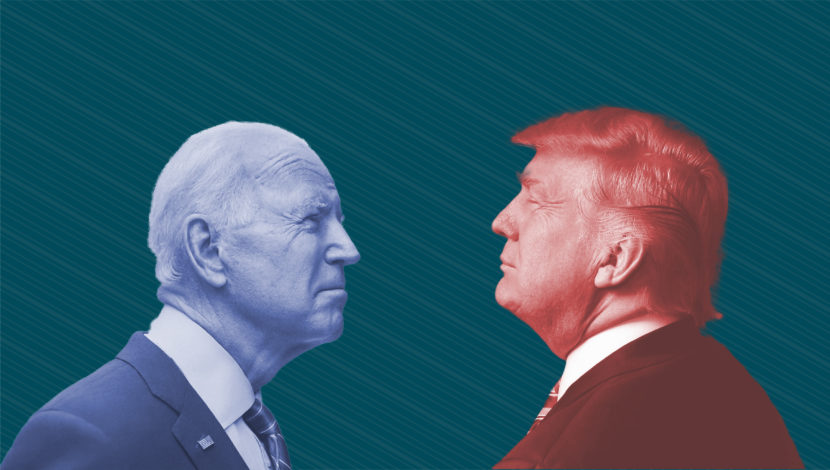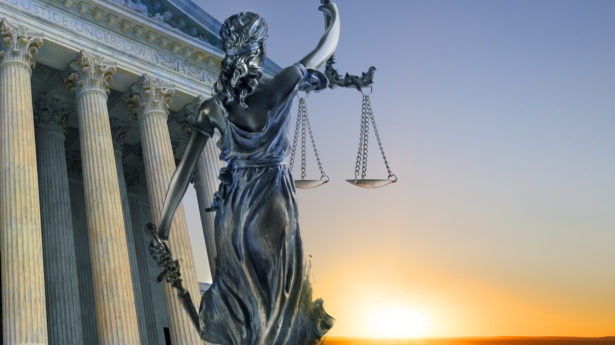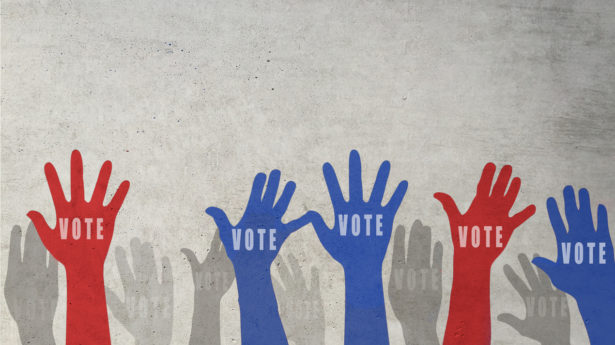The Unitarian Universalist Service Committee advances human rights through grassroots collaborations.
Trump’s Remarks on Debate Stage Threaten Human Rights and Democracy

By on October 1, 2020
The night of September 29, the nation watched as the U.S. president was asked on live television to do a simple thing: condemn white supremacy. Faced with this request, Trump paused for a moment—a brief silence that was in eerie contrast to his behavior throughout the rest of the evening, during which he kept up a stream of interruptions at every chance.
He then asked moderator Chris Wallace to name a group he should condemn. Wallace referred to white supremacist groups in general. Former Vice President Joe Biden pointed to the “alt-right”—an ideological cluster associated with the 2017 Neo-Nazi rally in Charlottesville (which Trump has previously failed to condemn).
Trump again balked. He then delivered his reply, telling members of far-right hate groups to “stand back and stand by,” before pivoting to a condemnation of left-wing anti-fascist groups. Not a word in opposition to anti-Black racism, antisemitism, Islamophobia, Neo-Nazi and Neo-Confederate movements or any of the other hateful ideologies he was asked explicitly to disavow.
It was a moment of crescendo in a night marked by more than one jarring note. At various points in the debate, the current president 1) seemed to encourage his supporters to intimidate people at polling sites (a practice with a long history of being wielded against Black and Latinx voters); 2) cast doubt yet again on the integrity of the election, echoing disinformation promoted by authoritarian governments abroad; and 3) refused to ask his supporters not to foment unrest or prematurely declare him the winner.
In short, the debate was a reminder of just how grave the threats to human rights and democracy in the United States have become under this administration. Trump’s failure to condemn white supremacy (a gesture instantly greeted with applause by far-right groups) was shocking—but not because it was out of character.
To the contrary, these comments were perfectly in keeping with the president’s prior actions and remarks. In the past, Trump has compared Syrian refugees to snakes, denigrated Somali immigrants, trafficked in anti-Asian slurs, adopted for his campaign a slogan associated with the Ku Klux Klan, and reportedly made antisemitic and racist comments to people close to him, among many other displays of bigotry and animus.
Even as the president’s behavior was raising red flags about the state of U.S. democracy, however, the debate offered next to no serious discussion of his human rights record in office. Much of the conversation dwelt on the question of whether and how soon officials should have implemented public health-related travel restrictions to contain COVID-19. Neither candidate, however, mentioned the far more extreme immigration and asylum bans that Trump has imposed under cover of the disease.
Trump repeatedly crowed from the debate stage about “banning China,” despite the fact that the United States under his watch has become a major exporter of the virus abroad. While temporary travel restrictions may be justified as a public health measure, meanwhile, these are very different from the kinds of categorical bans on immigration status and asylum that the Trump administration has imposed since March.
When Trump announced major restrictions on green cards in April, for instance, the administration did not even attempt to justify these measures on public health grounds, instead fictitiously alleging they would protect U.S. jobs. Even more concerning is the fact that the administration has exploited the virus to turn away unaccompanied children and bona fide refugees from the border without a hearing—a direct violation of international agreements.
This was not the only portion of the debate, however, in which the president’s appalling human rights record went unexamined. The president also railed against violence “from the left” —immediately after refusing to condemn far-right and Neo-Nazi violence—and once again described himself as the candidate of “law and order.” No mention was made of the many ways Trump has inflicted lawless violence on immigrants and protesters, while celebrating and glorifying police brutality and torture. Armed officials abusing their power with impunity is not “law and order”—indeed, it is the antithesis of the rule of law.
Trump also misrepresented his record on health care and the environment, describing himself as a champion of clean air and drinking water. In realty, the Trump administration has deliberately slashed regulatory safeguards designed to protect U.S. communities from dangerous pollutants, including mercury—a potent neurotoxin—as well as methane and other greenhouse gases. Despite the president’s efforts to distract from the issue during the debate, meanwhile, his administration is actively seeking to overturn the Affordable Care Act in court, putting health insurance in jeopardy for millions of people in the midst of a pandemic.
The president is not the only candidate whose actions deserve scrutiny on immigration, asylum, police violence, climate, health, and other key human rights issues. Vice President Biden also served in an administration with a flawed human rights record. Under the Obama presidency, the U.S. government deported hundreds of thousands of immigrants and revived the practice of detaining asylum-seeking families. As candidate for president, Biden should apologize for these decisions and commit to pursuing a different path in office.
In order for human rights to ever flourish in this country, however, both candidates need to at least recognize the legitimacy of the democratic process itself—and forcefully reject ideologies that undermine this process by denying full participation to all citizens. When the president of the United States cannot so much as say the words “I condemn white supremacy,” or commit to a peaceful transfer of power, then our nation is truly in peril. We must resist efforts to manufacture doubt about the election and do our part to uphold voting rights, protect human rights, and to support communities threatened by emboldened white supremacist groups.
***
About UUSC: Guided by the belief that all people have inherent worth and dignity, UUSC advances human rights globally by partnering with affected communities who are confronting injustice, mobilizing to challenge oppressive systems, and inspiring and sustaining spiritually grounded activism for justice. We invite you to join us in this journey toward realizing a better future!
Photo Credit: UUSC

